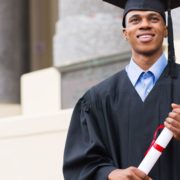Higher education—once a social institution—has become corporatized.
I know what higher education used to be. I was there. A half-century ago, it was the only place I wanted to be–even though I wasn’t entirely sure why.
I didn’t have a frame of reference for the college life.
My aspirations didn’t end with going to college and getting a degree. I wanted to devote my career to academics. I wanted to be a member of the professoriate–to teach, write, and, well, ‘profess.’ I imagined it would be grand to engage with colleagues, to help shape young minds, and to do all the other things that go along with being a faculty member.
Why? I’m not entirely sure … even now.
My aspirations were fueled by a single information source—the encyclopedia. I sat in the front room of my house and (for hours on end) read about college, learned about schools (when they were founded and why), and most importantly, visualized myself being a student and, then, becoming a faculty member.
It all came to pass, too. I went to college, did well, went on to graduate school, earned a doctorate, and became a tenure-track assistant professor at a major university. I worked hard, was promoted to professor, and then served in a variety of administrative roles–never entirely leaving the faculty life.
My experience, at first, was what I had imagined it to be. Then, things began to change, slowly but definitely, about halfway through my career.
Toward the end of a nearly 40-year career, I no longer recognized higher education–at least not what it had been and what drew me to it. It had changed fundamentally.
The irony is that the faculty and students hadn’t changed significantly. Many faculty members I knew were drawn to the Academy for the reasons that drew me to higher ed. And many of the students I taught (the best, in particular) were just like I was as a student–eager, studious, and devoted.
What changed, then? It was how higher education was being led and managed. The change crept in through the back door, then knocked down the front door and … well … settled in.
The Academy, which had been a social institution devoted to serving the public good–like all social institutions should–became corporatized. The language of administration changed. Words like branding, strategic advantage, and beating the competition entered the vocabulary.
When I entered higher ed, the vast majority of academic administrators were scholars who served in administrative roles. The best of the lot never used bureaucratic jargon to describe their leadership philosophy or approach. They were academics, after all. They spoke. We listened. They held our respect. They were one of us.
Of course, higher education (as all enterprises) needs to be run like a business. At issue, though, is whether those in charge today truly understand what business they are in. Some do, of course. But it still shocks me to discover how many do not.
Over time, the gap grew between administration and faculty. Faculty are (all too often) viewed with suspicion, kept at arm’s length, and rarely trusted. Yes, academic governance still exists (presumably for the purpose of expressing faculty voice and fostering faculty engagement), but many administrators have learned how to play academic governance like virtuosos playing the violin.
Over time, the walls that kept this kind of nonsense largely away from campus life came tumbling down—not by an act of God, but by intent.
Yes, I know things change. Only fools believe that they won’t. But this change is existential in nature–a change of kind, not degree. And it didn’t come by way of a revolution that everybody could see happening. It changed by way of an unannounced, stealth-like progression.
As I reflect on my experience in higher education, an adaptation of Alfred Lord Tennyson’s famous words come to mind.
‘Tis better to have experienced something special, which was then lost, than to have never experienced it at all.
Yes, it really was something special–something special that’s now lost.



